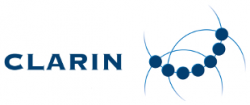Common Language Resource sand Technology Infrastructure (CLARIN ERIC)
27 April 2021
Modified: 27 April 2021
Reading time: 2 minute(s)
 Provides advanced digital language resources and tools primarily for scholars and social scientists.
Provides advanced digital language resources and tools primarily for scholars and social scientists.
Hungarian member organisation: HUNCLARIN.
| Short name | CLARIN ERIC | ||||
| Name | Common Language Resources and Technologies Infrastructure | ||||
| Official website | https://www.clarin.eu/ | ||||
| Year of foundation | 2012 | ||||
| ESFRI project/landmark | landmark | ||||
| Headquarters | Utrecht, the Netherlands | ||||
| Number of member countries | 21 | ||||
| Participating countries | Members: Austria, Bulgaria, Croatia, Cyprus, Czech Republic, Denmark, Estonia, Finland, Germany, Greece, Hungary, Iceland, Latvia, Lithuania, Netherlands, Norway, Poland, Portugal, Slovenia, Sweden Observer: France, South Africa, UK |
||||
| Hungary’s accession | 2016 | ||||
| Partner institutions in Hungary |
Research Institute for Linguistics University of Szeged Budapest University of Technology and Economics Department of Telecommunications and Media Informatics Budapest University of Technology and Economics Centre for Media Research and Education PPKE Faculty of Information Technology and Bionics PPKE Hungarian Language Technology Research Group Morphologic Ltd. Institute for Computer Science and Control University of Debrecen |
||||
| Public administration representative |
Szilvia Kassai National Research, Development and Innovation Office Department of Researcher Excellence 1077 Budapest, Kéthly Anna tér 1. Phone: +36 1 896 5610 Email: szilvia.kassai@nkfih.gov.hu |
||||
| Professional representative |
Tamás Váradi research fellow, Research Institute for Linguistics |
||||
| Membership payments | 2015: - 2016: EUR 5,322 (≈ HUF 1.6 million) 2017: EUR 13,028 (≈ HUF 4 million) 2018: EUR 13,289 (≈ HUF 4.3 million) 2019: EUR 13,554 (≈ HUF 4.7 million) 2020: EUR 13,825 (≈ HUF 5 million) |
||||
Benefits of the membership for Hungary
- The membership gives access for Hungarian researchers to state-of-the-art digital language resources.
- The integration of digital language resources provides electronic access to remote archives for researchers in linguistics, humanities and social sciences.
Updated: 27 April 2021






